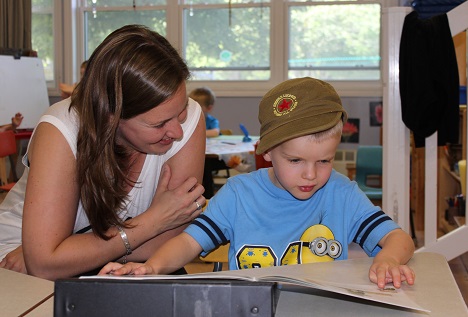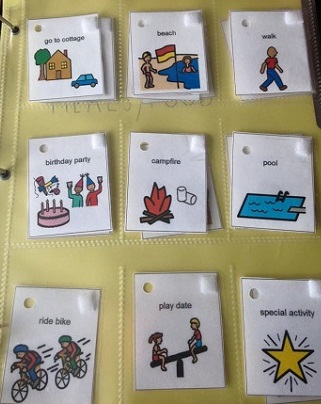“Our goal for all of our children is that they learn to love learning”
“Our focus is on helping all children understand that everyone is the same in some ways and different in others. By celebrating the differences that make us unique while remembering that we all want and need the same things, we help the children see past differences and understand that it is a part of life.” – Virginia MacNeil, Early Childhood Inclusion Educator, Child Study Centre, Mount Saint Vincent University
The Mount has long been known for offering a high-calibre, industry respected Child and Youth Study program, home to an on-site training facility called the Child Study Centre (CSC), which provides full and part-time daycare spots to local children.
What is perhaps not so well understood is the profound impact that this Centre has on the community they serve. Some of the children enrolled in the Mount’s program have developmental and cognitive challenges, such as Autism Spectrum Disorder. The CSC is structured to not only welcome these children into the mainstream classroom, but to educate the other children on the differences in others.
Allison Garber, the mother of a five-year-old son on the Autism Spectrum, has seen first-hand the impact the Mount’s philosophy has had not only on her child, but on all of the children in the classroom, “Perhaps most importantly, and most beautifully, is the experience the neurotypical children have at this daycare,” says Allison. “These kids are side-by-side with kids who aren’t built exactly the same way they are, and instead of being told that they aren’t different, they are told that differences are to be celebrated and accommodated, and that everyone needs to find some common ground and treat each other respectfully.”

“Because of this philosophy, this utopia that they have built, my son has a little posse of friends he races to see each day. The CSC staff that work with him have helped our son establish trust amongst this group. Where once he struggled to know the appropriate way to ask to play, he now knows what works for his buddies.” – Allison Garber
(At left, Virginia MacNeil and Allison Garber’s son in the CSC.)
This model of early education is passed on to the students in the university’s child and youth program who use the centre for their practicum experience, “Many Child and Youth students come to us with little to no experience with children who require extra support,” explains Virginia MacNeil, Early Childhood Inclusion Educator who has been with the CSC for the past ten years. “Our focus on individualized educational opportunities for all children allows students to see that the needs of a child with a diagnosis are no less than the needs of a child without a diagnosis.”
This model of early education is passed on to the students in the university’s child and youth program who use the centre for their practicum experience, “Many Child and Youth students come to us with little to no experience with children who require extra support,” explains Virginia MacNeil, Early Childhood Inclusion Educator who has been with the CSC for the past ten years. “Our focus on individualized educational opportunities for all children allows students to see that the needs of a child with a diagnosis are no less than the needs of a child without a diagnosis.”
The CSC team extends their support outside of the classroom, and Child and Youth Study students are often allowed to join in this experience. This includes providing counsel during assessments with IWK psychologists, working with the province’s Early Intensive Behavioural Intervention (EIBI) program team and welcoming speech language pathologists, early Interventionists, and occupational therapists into the classroom environment. In the majority of cases, children with identified needs are provided with an Individual Program Plan (IPP) or a Routine Based Intervention Plan (RBIP) which helps to identify and monitor the skills they need to work on. These are skills for both in the classroom and at home, with many of the teachers preparing things like social stories or visual schedules (see photos immediately below), tools that can provide great clarity to children on the Autism Spectrum.


“We develop these plans in consultation with the families and the professionals they are working with,” says Virginia. “We look at the big picture and look at the skills they use in their day-to-day lives taking recommendations first from the family and then from the professionals.”
The inclusion professionals at the Mount work hand-in-hand with families as the children transition to elementary school, attending transition meetings with the school staff and in many cases joining the students for primary orientation day to make the move less daunting. The program plans are carefully passed to the team at the elementary school making sure that the child’s strengths and challenges are understood and addressed.
Graduation from the CSC can be bittersweet for the children, and the families, that they serve. “While I know he is ready to move on to ‘big school’, there is a part of me that wishes we could protect him in this loving and understanding environment for all of eternity,” says Allison. “That said, we could not be more prepared for the next step in our son’s journey because of the work of Virginia and the team at the CSC.”